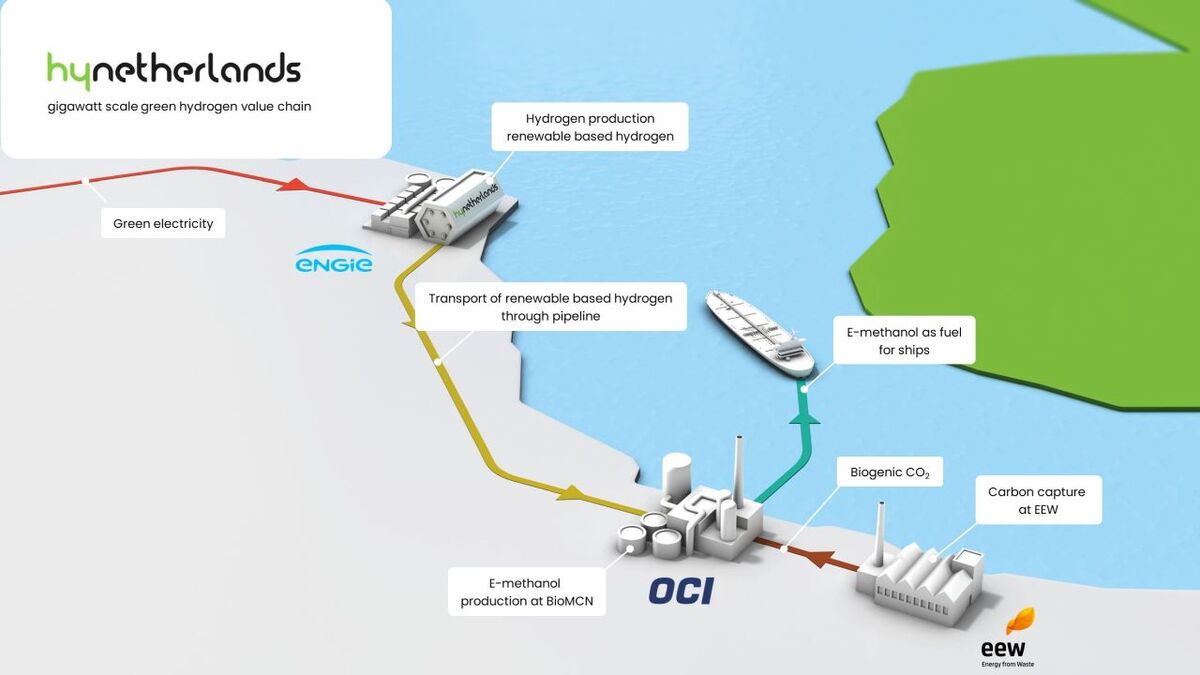 Renewable hydrogen for the HyNL facility will be produced using electricity from offshore windfarms in the North Sea (source: HvNL)
Renewable hydrogen for the HyNL facility will be produced using electricity from offshore windfarms in the North Sea (source: HvNL)
Engie, OCI and EEW have announced their intention to develop a commercial-scale hydrogen-based value chain producing e-methanol in the north of the Netherlands
In the HyNetherlands (HyNL) project, they plan to develop, build and operate a large-scale facility capable of producing e-methanol (that is, methanol produced by combining green hydrogen and captured carbon dioxide from industrial sources).
The plan combines the use of renewable hydrogen and biogenic CO2 (carbon dioxide released as a result of the combustion or decomposition of organic material such as biomass and its derivatives).The renewable hydrogen will be produced using electricity from offshore windfarms in the Dutch sector of the North Sea.
The first phase of the project will consist of a 100-MW electrolyser that will produce hydrogen for e-methanol production and deliver renewable-based hydrogen to the mobility and industry sectors.
The HyNL project will connect sites at three different locations. Engie’s hydrogen production facility will be located on the site of the Eems power plant in Eemshaven. The 100-MW electrolyser will be powered by 200 MW of electricity from offshore wind turbines.
EEW will develop a carbon capture integrated with an existing waste-to-energy plant in Farmsum. It will capture biogenic CO2 from the flue gases at the plant. CO2 logistics and infrastructure will be provided by Groningen Seaports.
OCI’s ‘BioMCN’ methanol facility at the Delfzijl chemical park in Farmsum has the capacity to combine hydrogen and biogenic CO2 to produce e-methanol.
Engie and OCI’s BioMCN plant will be connected to a hydrogen network that Gasunie is developing throughout the Netherlands and northern Germany.
Obtaining financial support and government approval for the project are key priorities. To this end, the companies have applied for grants from the EU Innovation Fund.
The long-term vision is for HyNL to play an increasingly important role in the decarbonisation of industrial and transport sectors in the region, with plans to scale up electrolyser capacity from 100 MW in 2025 to 1.85 GW in the early 2030s.
Engie managing director thermal Europe Cedric Osterrieth said HyNL will help meet CO2 emissions reduction objectives and provide a decarbonisation solution for multiple industrial sectors that currently have a high carbon footprint.
OCI chief executive Ahmed El-Hoshy described methanol as one of the most effective green hydrogen carriers and EEW chief executive Bernard Kemper said the project “will not only ensure circularity, utilising biogenic CO2 from non-recyclable waste, but will reduce CO2 emissions through the use of e-methanol and hydrogen rather than fossil fuels.”





